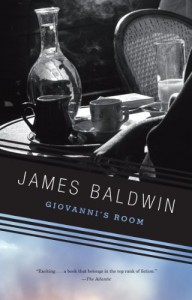Giovanni's Room
 This novel was everything I thought it was not going to be. And this time, I don’t blame my expectations for disliking a book. It did make an impression on me, albeit for all the wrong reasons.
This novel was everything I thought it was not going to be. And this time, I don’t blame my expectations for disliking a book. It did make an impression on me, albeit for all the wrong reasons.I feel that Baldwin did no research before writing this book. He just used bits and pieces that he had heard of here and there and scrambled together a story that to me felt disjointed and predictable. I felt like he wanted to write about a sensible issue yet chose the wrong tools. I thought themes of homosexuality, lust, longing, love, fear, stigma will be central to the plot. If they were I never noticed because they were suffocated by all the prejudice and preconception the characters were built upon. They all fell flat, one-dimensional and hateful.
Why write about a sensitive topic that was considered unorthodox back in the day (and, sadly, still is to some extent) and make all your characters so conventional and judgmental? Was it supposed to create some kind of a contradiction in order to enhance the message?
I don’t know. Maybe I just didn’t understand this or maybe the below was just not my type of crowd:
The woman: ’Hell, I want to be knocked up. I want to start having babies. In a way, it’s really all I’m good for.
The confused man: ’I don’t see what’s so hard being a woman. At least, not as long as she’s got a man.’
The woman and the confused man: I stepped away from her. She swayed where I had left her, like a puppet dangling from a string.
‘David, please let me be a woman. I don’t care what you do to me. I don’t care what it costs. I’ll wear my hair long, I’ll give up cigarettes, I’ll throw away the books.’ She tried to smile; my heart turned over. ‘Just let me be a woman, take me. It’s what I want. It’s all I want. I don’t care about anything else.’
The homosexual man: ‘Oh, well’, said Giovanni, ‘these absurd women running around today, full of ideas and nonsense, and thinking themselves equal to men – quelle rigolade! – they need to be beaten half to death so that they can find out who rules the world.
The Italian man: ’Yes, I wanted to stay there and eat much spaghetti and drink much wine and make many babies and grow fat.’
The Italian man to the American man: ’I can see you, many years from now, coming through our village in the ugly, fat, American motor car you will surely have by then and looking at me and looking at all of us and tasting our wine and shitting on us with those empty smiles Americans wear everywhere and which you wear all the time and driving off with a great roar of the motors and a great sound of tires and telling all the other Americans you meet that they must come and see our village because it is so picturesque.’
To me this novel was an attempt to fight fire with fire, all the way not knowing how to light a fire.




